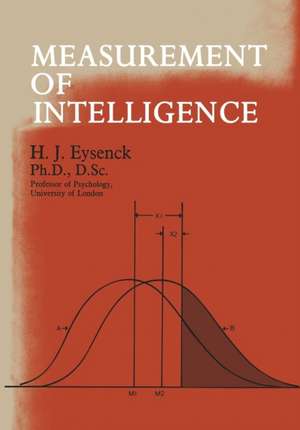The Measurement of Intelligence
Editat de Hans J. Eysencken Limba Engleză Paperback – 22 feb 2012
Preț: 386.83 lei
Preț vechi: 407.19 lei
-5% Nou
Puncte Express: 580
Preț estimativ în valută:
74.02€ • 79.15$ • 61.72£
74.02€ • 79.15$ • 61.72£
Carte tipărită la comandă
Livrare economică 18 aprilie-02 mai
Preluare comenzi: 021 569.72.76
Specificații
ISBN-13: 9789401161312
ISBN-10: 9401161313
Pagini: 504
Ilustrații: 488 p.
Dimensiuni: 178 x 254 x 26 mm
Greutate: 0.87 kg
Ediția:Softcover reprint of the original 1st ed. 1973
Editura: SPRINGER NETHERLANDS
Colecția Springer
Locul publicării:Dordrecht, Netherlands
ISBN-10: 9401161313
Pagini: 504
Ilustrații: 488 p.
Dimensiuni: 178 x 254 x 26 mm
Greutate: 0.87 kg
Ediția:Softcover reprint of the original 1st ed. 1973
Editura: SPRINGER NETHERLANDS
Colecția Springer
Locul publicării:Dordrecht, Netherlands
Public țintă
ResearchCuprins
I History and Definition of the Concept.- The Evidence for the Concept of Intelligence.- On Defining Intelligence.- II Measurement and the Problem of Units.- The Absolute Zero in Intelligence Testing.- Is Intelligence Distributed Normally?.- III Development and Constancy of the IQ.- The Effect of the Interval between Test and Retest on the Constancy of the IQ.- The Limitations of Infant and Preschool Tests in the Measurement of Intelligence.- Intellectual Status and Intellectual Growth.- IV Types of Intelligence.- Primary Mental Abilities.- Organization of Abilities and the Development of Intelligence.- A Culture-Free Intelligence Test.- Ability Factors and Environmental Influences.- Personality and Measurement of Intelligence.- V Analysis of IQ Performance.- Intelligence Assessment: a Theoretical and Experimental Approach.- Intellectual Abilities and Problem-Solving Behaviour.- The Speed and Accuracy Characteristics of Neurotics.- Individual Differences in Speed, Accuracy, and Persistence: a Mathematical Model for Problem Solving.- VI Heredity and Environment: I. Twin and Familial Studies.- Genetics and Intelligence: a Review.- Twins: Early Mental Development.- IQs of Identical Twins Reared Apart.- VII Heredity and Environment: II. Foster and Orphanage Children.- A Critical Examination of the University of Iowa Studies of Environmental Influences upon the IQ.- The Relative Influence of Nature and Nurture upon Mental Development: a Comparative Study of Foster Parent-Foster Child Resemblance and True Parent-True Child Resemblance.- VIII Intelligence and Social Class.- Intelligence and Social Mobility.- Achievement and Social Mobility: Relationships among IQ Score, Education, and Occupation in Two Generations.- Differential Fertility and Intelligence: Current Status of the Problem.- Does Intelligence cause Achievement? A Cross-Legged Panel Analysis.- Ability and Income.- IX The Biological Basis of Intelligence.- Evoked Cortical Potentials and Measurement of Human Abilities.- Effects of Glutamic Acid on the Learning Ability of Bright and Dull Rats.- Effects of Heredity and Environment on Brain Chemistry, Brain Anatomy and Learning Ability in the Rat.- X The Paradigm and Its Critics.







